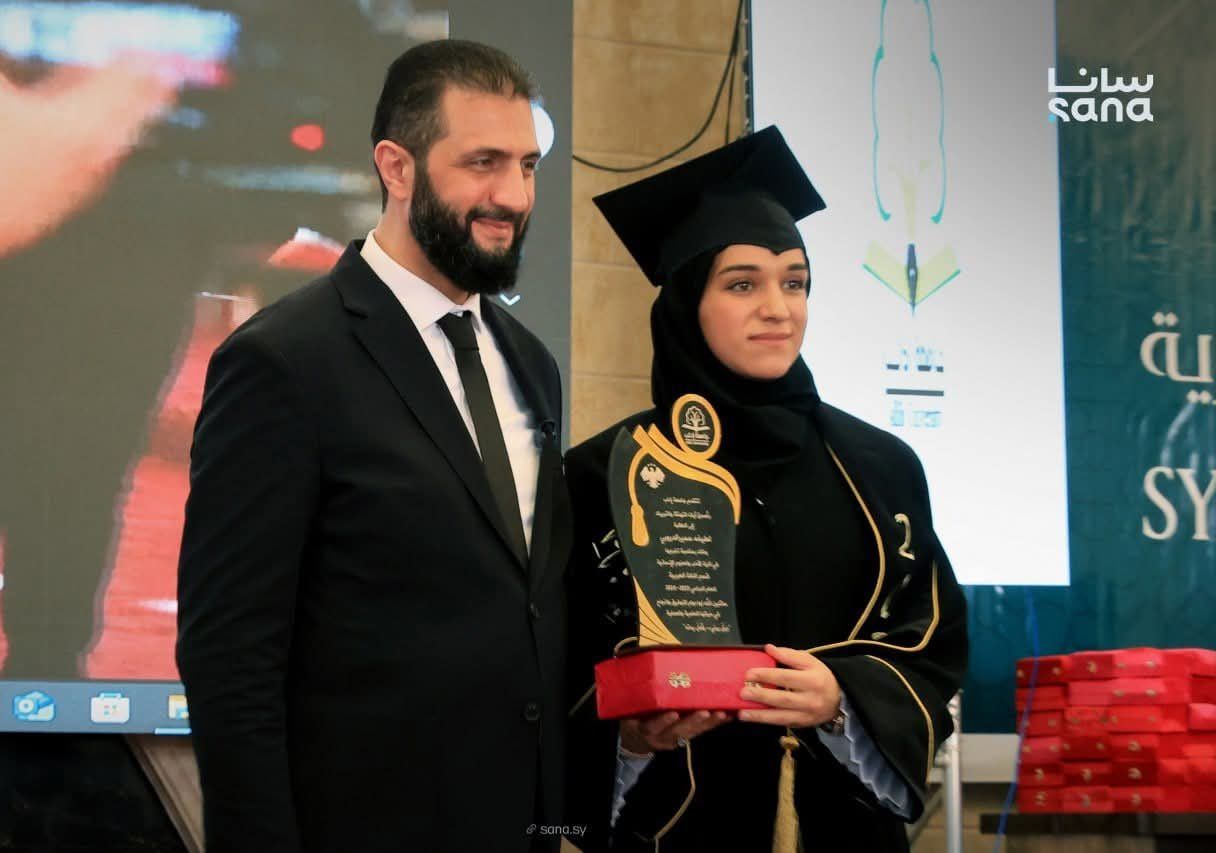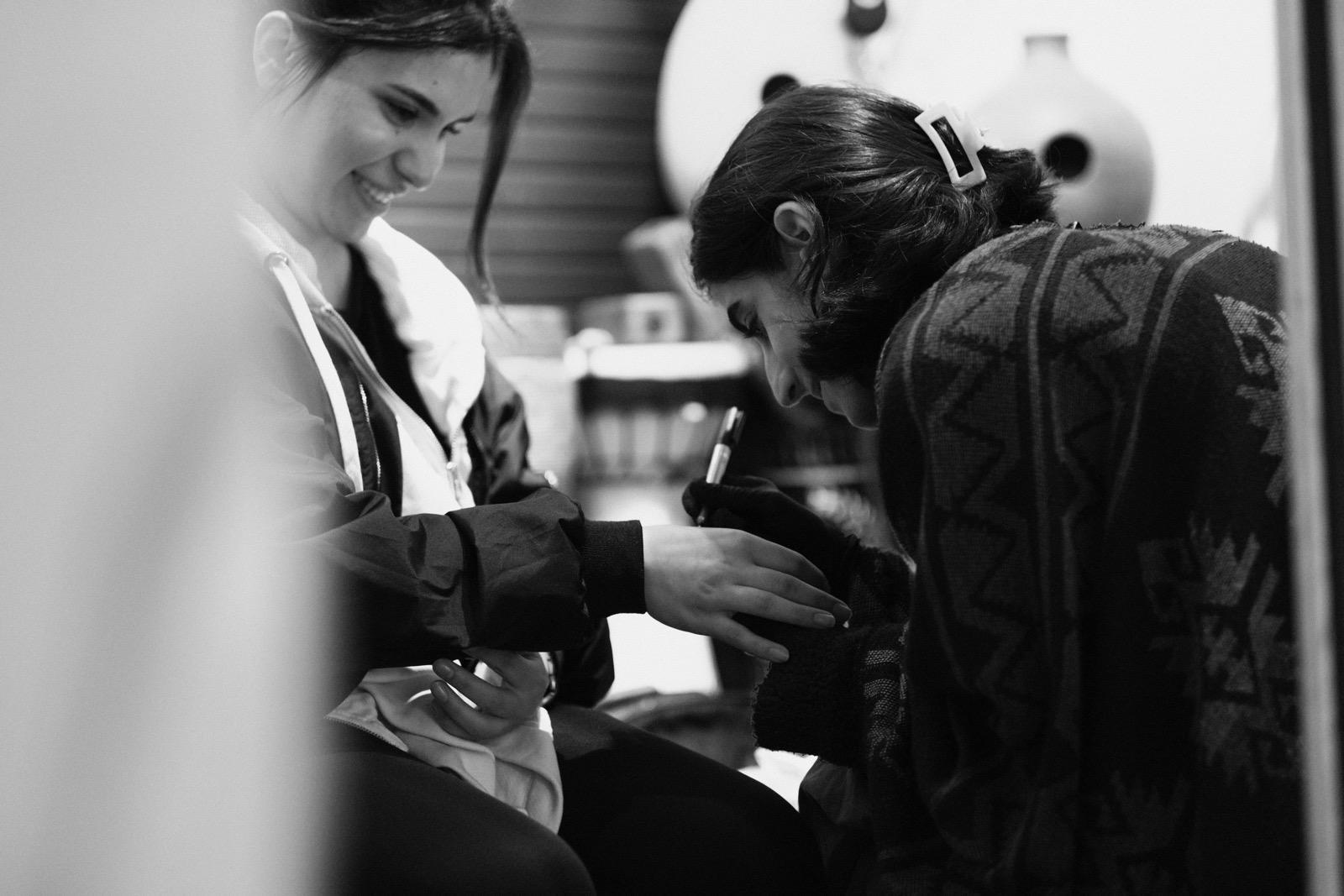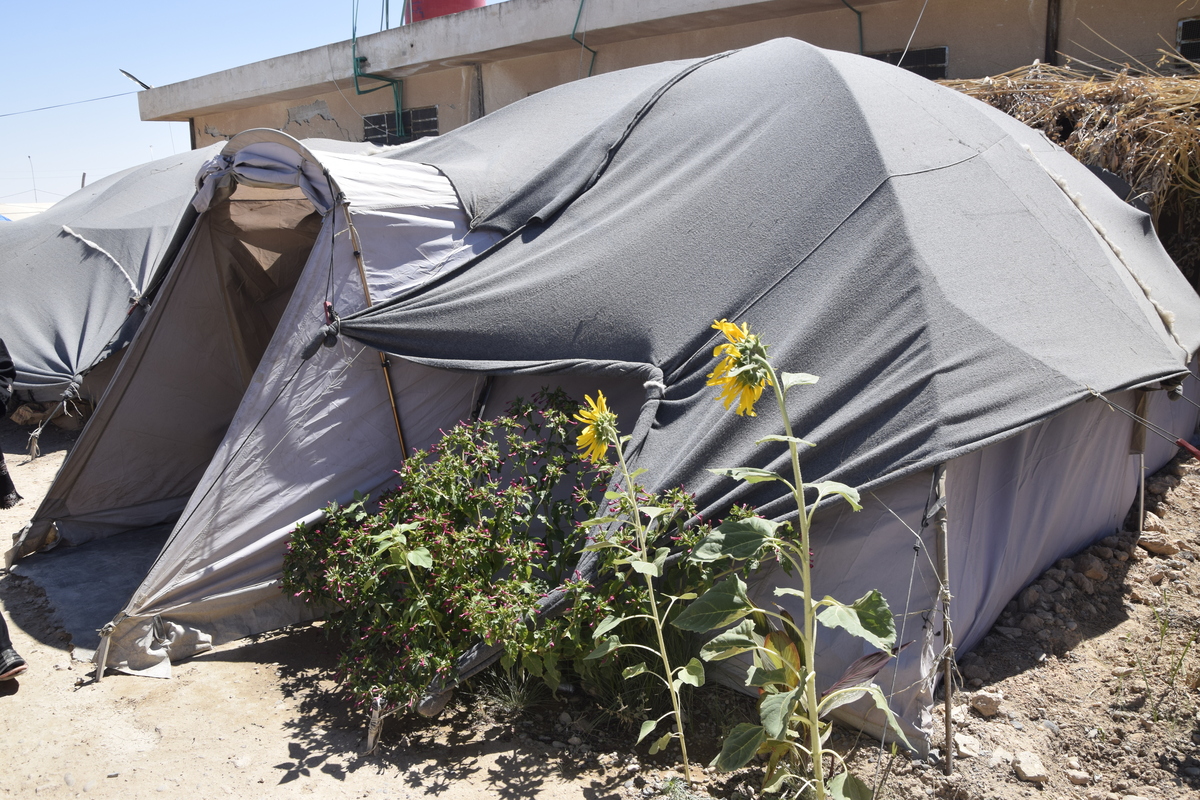Performative Feminism: Syria’s Women Turned into Spectacles under the New Regime

Latifa al-Droubi, wife of Syrian interim President Ahmad al-Sharaa, graduates with the “Victory and Liberation” class at Idlib University, September 7, 2025 | Picture credits: SANA Agency
Latifa al-Droubi, wife of Syrian interim President Ahmad al-Sharaa, graduates with the “Victory and Liberation” class at Idlib University, September 7, 2025 | Picture credits: SANA Agency
She carries herself delicately on stage, composing herself before pronouncing the first words of her act:
“Assalam Alaikum wa Rahmatu Allah wa Barakatuh”.
On that special day, Latifah al-Droubi, the wife of Syrian Interim President Ahmad al-Sharaa, graduated from the Faculty of Humanities at the University of Idlib. Unsurprisingly, she was chosen to give the graduation speech:
“During the past years, I have grown more firm in my belief that defeat does not suit the Syrian woman. That every mother, widow, and student has the potential to be an illuminating candle and a growing seed for this country.”
The rhetoric —inclusive and progressive— could be seen as a slap in the face of the “Syria is the new Afghanistan” crowd.
“Yes, we deserve life”, al-Droubi spoke, as Dr.Zeina Jdeed and Dr.Mohammad Sharif attended their graduation from the University of Latakia through the memories of their classmates.
“We deserve happiness”, she said, as the University banned mourning memorials for such murdered students and other “political and social gatherings”.
“Let this be the day Syria progresses by its education, not its blood”, rang her words. Perhaps the university graduation speech did not include Tala Al-Shofi‘s soul, as she was only a ninth grader (and Druze).
“I would like to thank my first supporter, of course, my husband: Mr. President Ahmad al-Sharaa”.
A round of applause echoes in the room, to some, not even loud enough to recognize the commitment of such an exemplary man. The messaging is clear: even when busy besieging Suwaida for over 60 days, where over 103 women went missing, our President still takes time to be there for his wife. It is now considered ignorant to still view him as a terrorist.
This scene was not a speech, but an act in which the object was Latifah’s womanhood – not her words. Whether she was an active agent or a mere actress, this mise-en-scène was not to send any profound message, but to sell an idea: the Syrian government is progressive.
…social media posts glorifying the seemingly beautiful relationship between al-Sharaa and his wife flooded Facebook, with an ironic resemblance to familiar images of Bashar and Asma al-Assad
The act was successful across different audiences. The new government’s supporters from the general public are not hard to please; social media posts glorifying the seemingly beautiful relationship between al-Sharaa and his wife flooded Facebook, with an ironic resemblance to familiar images of Bashar and Asma al-Assad. However, surprisingly, an unlikely audience was found among some self-proclaimed intellectuals, who are known for their research on the atrocities al-Assad committed against women. They were now happily cheering Latifah as she descended from the stage, celebrating their elitist scholarly opinions as students from Suwaida lose access to education; partaking in this performance of feminism, while ‘Alawi and Druze women –even young girls – are killed, raped, and abducted.
This is not the first incident in which women’s issues are turned into occasions for performance to serve other interests. Another remarkable example would be Mira’s alleged abduction. On 9 May 2025, footage appeared on social media of Mira, a missing girl from an ‘Alawi background, walking with an unknown man while fully covered in a burqa. Public opinion was divided between opponents and supporters of the government. The former were accusing the new rulers of facilitating human trafficking and forced marriages of abducted ‘Alawi women, who have suffered from increased disappearances after al-Assad’s fall. The latter were buying into the story of Mira running away from home to marry a Sunni man she fell in love with, but whom her family disapproves of.
Following further investigations, it was decided that no crimes were committed and that the issue was merely a family problem. The outcome was devastating: ‘Alawi women were no longer to be believed, and Mira was to blame for it.
For both sides, Mira’s case was the final sentence for all ‘Alawi women.
For both sides, Mira’s case was the final sentence for all ‘Alawi women. Government sympathizers found in Mira a scapegoat to dismiss all other cases of missing ‘Alawi women, past, present, and future. Meanwhile, opponents of the government blamed Mira for the perceived discrediting of other cases. While Mira’s social media content and fame may arguably not allow for much understanding and consideration for her, it is absurd to turn on her rather than call out the government for not taking action for the other missing women. Taking Mira as an occasion, government sympathizers happily choose to ignore or dismiss these cases. It seems as though the story of Mira was a game —a horse each team has put money on. The other 36 documented women? Pocket money.
Thus, the truth is suffocated in the hands of online arguments, reduced to prepackaged opinions already prepared to impose an ideology.. Amid this, the connection to what truly matters gets lost, as women are being traded for performative stances.
By 8 September 2025, the Syrian Observatory for Human Rights documented 236 sectarian murders in Homs, 183 in Hama, 93 in Latakia, 60 in Tartus…
By 8 September 2025, the Syrian Observatory for Human Rights documented 236 sectarian murders in Homs, 183 in Hama, 93 in Latakia, 60 in Tartus, making up 63%, 69%, 80%, and 75% of all vengeance crimes, respectively. Clearly showcasing a rise in hate crimes against ‘Alawis, these statistics also speak of the government’s lack of action. ‘Alawi women have become an easy target, one that no judge is to protect.
The massacres continue, and so does the acting. Rawan, an ‘Alawi woman, was sexually assaulted in broad daylight on her way to work and left on the street stripped of her clothes. Drawing public attention, her story became an occasion for yet another performance, this time by Hind Kabawat, Minister of Social Affairs and Labour.
“I have personally contacted Rawan’s family to check in on her”, the Minister said. “This is not a private matter, but a societal issue”.
But Rawan is not a victim in a singular story. Merely posting promises on Facebook and treating one case as an isolated incident will not bring about justice. Were the 103 missing women from Suwaida —including seven documented rape cases— private matters?
Women’s issues, bodies, and souls are not trends. The will to protect and liberate them must be a commitment, fulfilled every day. No woman must be forgotten. Each and every single one deserves daily struggles for her rights.
It is not enough to simply condemn what is happening.
Things must change. Not performative stances, but real action is needed. Such a change does not come about after a single incident. Meaningful change begins with the understanding that these issues stem from a sectarian and sexist system that produces them.
Editor’s note: The author’s name has been withheld for security reasons, as per her request. She is a writer based in Syria.
The Amargi
Amargi Columnist



